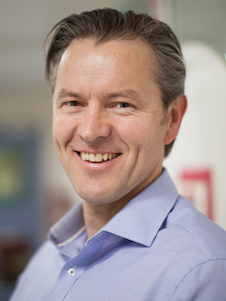With a lack of CoVID-19 circulating in our community, fewer other viruses and bacteria than usual, and good systems for detection and contact tracing in place, it is as safe as it has ever been for children to attend school.
That's the consensus of two University of Otago infectious disease experts, as schools prepare to re-open this week. A new study in Australia looking at children exposed to COVID-19 in a school setting also supports this view.

Associate Professor Tony Walls.
Associate Professor Tony Walls is a paediatrician and infectious diseases researcher at the University of Otago, Christchurch. Professor Philip Hill is an infectious diseases and public health specialist. Both are leaders of the University's Global Health Institute.
Associate Professor Walls says COVID-19 is a serious infection and the country needed to act together to stop it spreading and try to eliminate it. But the success to date of lock-down measures and scientific evidence from overseas means parents should feel comfortable about sending their children back to school.
“A question many parents will be asking themselves is: 'How safe is it to send children to school?' The answer is sending your children to school is as safe as it's ever been,'' Associate Professor Walls says.
Overseas evidence shows while children can be infected with COVID-19 they seldom become sick enough to need to go to hospital and are not the main spreaders of infection in communities, he says.
A recent study in Australia tested contacts of teachers and children who tested positive for COVID-19. Only 2 cases occurred among 863 close contacts in schools where the 18 cases occurred. No child-to-child transmissions occurred in primary schools. The only child infected at primary school got it from their teacher, the study reported.
Associate Professor Walls says data from COVID-19 hot spots confirm the lower risk of children as carriers and patients. In the United States there have been more than 150,000 laboratory-confirmed cases of COVID-19 but fewer than one per cent (0.7%) occurred in children, and the majority were in children aged over 10. In Iceland, where 6% of the population, or more than 9000 people were tested, no child under age 10 tested positive. Only 0.8% of children older than this returned a positive test.
In Italy, paediatric emergency departments have seen, depending on the region, between 73% and 88% fewer child patients compared with the same time in previous years.
Associate Professor Walls says COVID-19 seems to be very different from infections like influenza where children are the main spreaders of the virus in communities and often become sick enough to be hospitalised.
Professor Philip Hill says there are examples of countries who have successfully controlled the spread of COVID-19 while allowing children to attend school. In Singapore schools remained open at the start of the pandemic and there have not been any outbreaks occurring in children. Professor Hills says a cross-sectional survey of 700 participants in Stockholm, Sweden, found only 2.5% of children were positive for COVID-19.
“It just doesn't make sense to say this virus spreads widely in schools when there have been very few children affected in other countries where schools have been open. When children do get COVID-19 it is usually acquired from an infected adult family member,'' Professor Hill says.
“This is quite different to influenza, for which children are the main spreaders in communities and the most likely of anyone, other than the elderly, to be sick enough to be hospitalised,'' Professor Hill says.
“Nobody can say your child is not going to get an infection if you send them to school. Families around the country deal with this every winter with influenza and many other viral infections. The best protection for everyone in a school is to keep children and adults away from school if they are unwell, and to encourage everyone to wash their hands regularly during the day. Vaccinating your child against influenza every year is a good idea.”
For more information, contact
Associate Professor Tony Walls
Department of Paediatrics
University of Otago, Christchurch
Email tony.walls@otago.ac.nz
Professor Philip Hill
Department of Preventive and Social Medicine
University of Otago
Email philip.hill@otago.ac.nz
Kim Thomas
Senior Communications Adviser
University of Otago, Christchurch
Mob +64 27 222 6016
Email kim.thomas@otago.ac.nz
FIND an Otago Expert
Use our Media Expertise Database to find an Otago researcher for media comment.